Sailing ship 'Balclutha', San Francisco Maritime National Historic Park, Hyde Street Pier
Hyde Street Pier was once the terminus for ferries across the Golden Gate, but these ceased when the bridge opened. Nowadays the pier is home to the San Francisco Maritime National Historic Park which has a number of historic ships on display. Shown here is the Balclutha, a steel-hulled, square-rigger built in 1886 by the Charles Connell and Company shipyard near Glasgow in Scotland.
Pier 39 & Christmas Tree
The most visited attraction in San Francisco is full of tourist shops selling everything from souvenirs to chocolate. Pier 39 is also home to some good restaurants and the place to try a San Francisco speciality, clam chowder in sourdough bread. Although the fishing fleet is much reduced in size there is still a small fleet of commercial fishing boats and they provide fresh catches for the many restaurants that specialise in fish and seafood. Click Tab 2 to see the San Francisco Carousel and some of the shops at the end of Pier 39.
Sealions by the end of Pier 39
The end of Pier 39 provides a good view of Alcatraz and also a partial view of the Golden Gate Bridge. The best view at the end of the pier is of the Sea Lions that have colonised some of the pontoons beside the pier. They first arrived in January 1990 shortly after the 1989 Loma Prieta earthquake and have stayed ever since. In summer most of the Sea Lions head for the breeding grounds on the Channel Islands, but in winter the population at Pier 39 can swell to many hundreds.
Lombard St (crookedest street)
San Francisco is very, very hilly. Lombard Street between Hyde and Leavenworth Streets used to have a gradient of 27 degrees but in the early 1920s it became clear that it was too steep for pedestrians, most cars could not climb it and in either direction cars risked running away down the hill. The solution implemented in 1922 was to reduce the gradient turning this section of Lombard Street into a narrow zig-zag with hairpin bends. Traffic is permitted only in the downhill direction. Although it is known as the Crookedest Street in the USA, some people have suggested that Wall Street in New York may have a better claim to the name. Click Tab2 to see a car winding its way down the crookedest street.
Fisherman’s Wharf
San Francisco’s location at the end of a peninsula with the Pacific Ocean on ones side and the relatively sheltered San Francisco Bay on the other ensured that it grew up as a city with strong seafaring links. While most of the ferries arrived at the Ferry Terminal for the Downtown area, the fishing fleet was based at wharves on the north east of the peninsula where they were closer to the Golden Gate. The wharves became a market place for fish and also a area where fish eateries sprang up. Other industries also set up in the area including a fruit cannery and a chocolate factory. In the 1930s the cannery closed, the chocolate factory moved away and the area went into decline. From the 1960s the area back to life with the Cannery converted to a shopping complex and derelict wharves converted into tourist attractions.
DLU120715
Click on Minimap to navigate
Home > US States > The West > California > San Francisco >
Church of St. Peter & St. Paul from Washington Square
The Roman Catholic Church of St. Peter & St. Paul was founded in 1884 at a site on Filbert Street in the North Beach neighbourhood. The original church was razed to the ground in the 1906 earthquake. It was replaced by the current church which opened in 1924. The twin spires of the church rise 58 metres (191 feet) from the ground. Click Tab 2 to see the interior of the church.
Coit Tower from near Pier 39
On your first visit to San Francisco a trip to the top of the Coit Tower is a must. The tower was constructed at the top of Telegraph Hill in 1933 using a bequest from Lillie Hitchcock Coit, a wealthy patron of San Francisco’s firefighters. The 64 metre (210 foot) high reinforced concrete tower provides a panoramic view of the Downtown area, Fisherman’s Wharf, the Bay, Alcatraz and the Golden Gate Bridge.
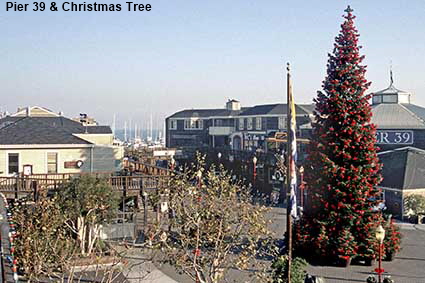
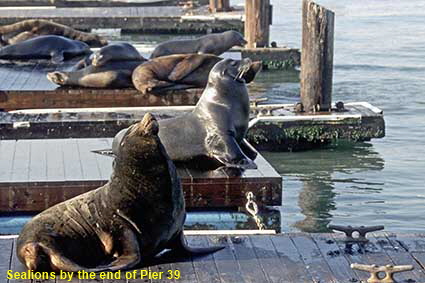
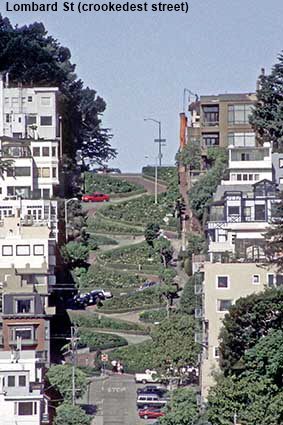
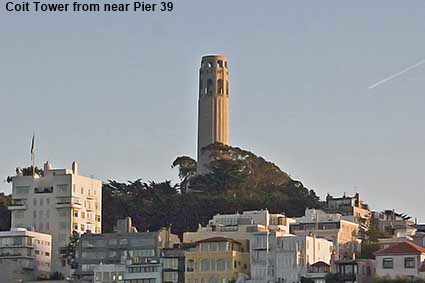
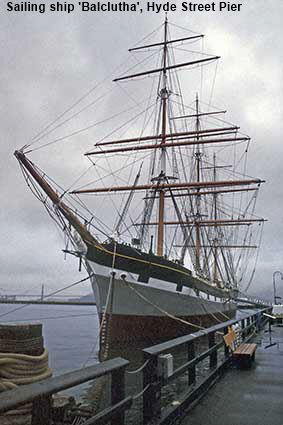



To move forwards or backwards through the San Francisco trail click the arrows above, or select your next destination on the Minimap.
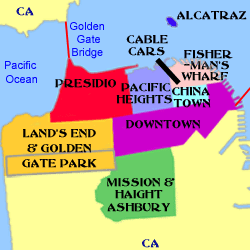

© Mike Elsden 1981 - 2025
The contents of this page may not be reproduced in full or in part without permission